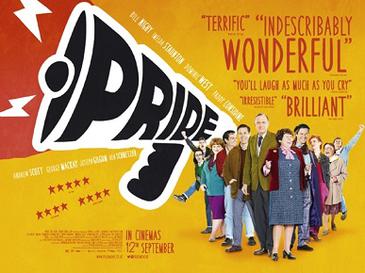
Alyssa VanPelt-Cathcart, Staff Writer
Through the collaboration of several clubs and organizations on campus, the campus held a viewing of the movie “Pride.” The organizations involved to make this event happen were the University Council on Diversity, Office of Global Education, History Club, Student Activities Council, Accessibility Resources, Women & Gender Studies Club, Gender & Sexuality Alliance, and Gender and Sexuality Resource Center with Professor Matthew Hendley as a host.
Homosexuality has been a controversial and hushed topic within most of the globe. England is considered to be very progressive and focuses on the happiness within their communities. However, even as of most recently, homosexuality was dangerous for those who participated and illegal. Professor Hendley gave a presentation on the historical background of homosexuality, Thatcher, and the miners strike in the UK.
The segment on homosexuality explained the history of the rights of people of the queer community from the 1800s to present day. According to Hendley, the Victorian Period was very restrictive for queers. He notes what happened to Oscar Wilde, a famous author who lived from 1854 to 1900. He wrote “The Picture of Dorian Gray” and “The Importance of Being Earnest.” These novels alluded to queer tension amongst the male characters. Wilde, after being accused of homosexuality, was put on trial to prove his innocence. During this trial, his novels were used against him to suggest he feels the things his characters feel. However, the court put his private sex life on display within the courtroom, this solidified his guilty verdict. He was sentenced to hard labor for a few years before ending his own life. Wilde’s fame and success was diminished because of his “guilty” verdict. At this time, being queer was worse than being a murderer.
Thatcher, a prime minister of the UK, was in office from 1979 to 1990. During her time, she passed section 28 of the local government act. This act prevented local governments from encouraging homosexuality. Prior to this, Leo Abse, another prime minister, would legalize homosexuality in 1967 under the condition that participants be twenty-one years or older. In 2003, section 28 of the local government act was overturned.
However, it was not until as recently as 2014 that same-sex marriage was legalized in the UK. The Pride movie takes place during the 1980s as the miners’ strike occurred between 1984 to 1985. Why does this movie, or period of history matter? The Pride movie is attempting to remind people that if people of different backgrounds can band together once, they can do it again. The Pride movie follows several queer individuals who behave like a found family. The leader of their group, Mark Ashton, realizes that Thatcher’s laws are affecting the miners as well as their community. So, Mark leads a small crew of their community to form LGSM, Lesbian & Gays Support the Miners. Although LGSM does receive push back from within the mining community that the movie primarily focuses on, it does result in making significant change. By the end of the film, the miners were successful in their strike thanks to the support of the queer community. Additionally, same-sex relationships were further legalized thanks to the Labour Party: which is supported by the miners.
Outside of the historical importance, Pride does really well to show the nuances of each character to bridge the gap between LGSM and the miners. It would be of high recommendation that people go watch this film if they wish for both to learn more about the history of the queer community in the UK, or for an overall fun but dramatic film.

Leave a Reply